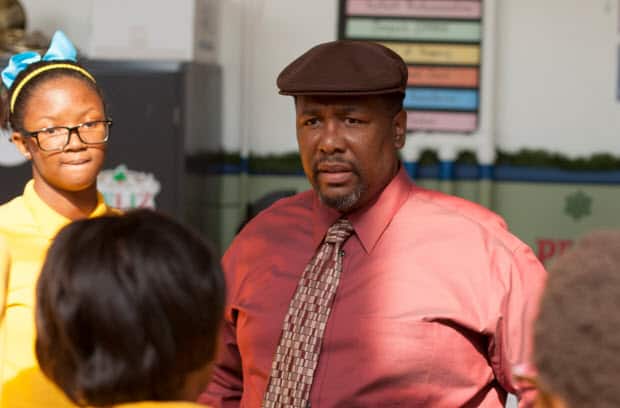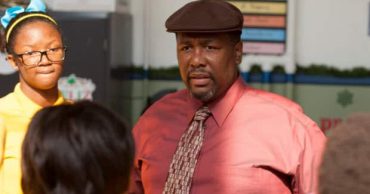
It’s the fall of 2008, and hope is in the air in New Orleans. Not the same kind of “well, things can’t get any worse, so it’s gotta get better” kind of hope we’ve seen in the first few seasons of Treme: “Yes We Can Can” spends its hour firmly establishing a tone that things are finally changing around New Orleans — or at least, people are trying to find some kind of professional or personal progress to hang their hats on. One of David Simon’s favorite socio-political themes is the deconstruction of the word “progress”: when the people (and the political systems enveloping them) are disillusioned to the point of absolute ineffectiveness, is there such thing as “progress”?
Of course, the answer — be it Homicide: Life on the Streets, The Wire, or Treme — is always the same: hope doesn’t guarantee victory, or even an appearance of change. As Kermit Ruffins walks into the street, blasting out “A Change Is Gonna Come” in the season’s opening scene, he slowly walks away from the hopeful crowd celebrating Obama’s victory, and looks around the neighborhood he calls home. The houses are still broken, covered in decrepit boards and faded siding. Police lights still loom in the background, an ever-dangerous system whose volatile relationship with New Orleans’ music culture that hasn’t pacified much further since season three’s premiere. Things appear to be taking a step forward for New Orleans — but even as the cogs of change appear to be turning for the world and its characters, many characters find themselves in DJ Davis’s position: ready to head in a new direction, but unable to navigate around the same old potholes that have existed for years.
Much of “Yes We Can Can” focuses on re-establishing its main characters after the show’s long hiatus, introducing what few story lines that can be executed in the truncated five episodes of the final season. But the thematic unity I expect from Treme remains intact: every character on this show is searching for a new direction in these final episodes, looking to those they love for support as they look for the ‘simple’ answers. There are some interesting existential little tidbits (the circle of life Delmond talks about, which plays out in hilarious fashion elsewhere when Antoine helps Robert get rid of the clap), but “Yes We Can Can” is pretty straightforward with its narrative, even going a little on-the-nose at times (Davis’s conversation with Nelson at the end of the episode being the most obvious example of this).
But this isn’t to say it’s a bad episode: with only five hours left to spend in New Orleans, Simon and company aren’t attempting to change the narrative pace of the show, which plods along slowly, much like the social and political “progress” it often explores. Treme is strictly a character-driven show (even with its biting cultural critiques) and “Yes We Can Can” certainly doesn’t forget it, filling its hour-long running time with the long musical sets and slow-burning conversations that drive television-watching audiences away in droves.
If anything, “Yes We Can Can” shows the characters of Treme embracing a more positive form of hope (except Davis, who introduces Nelson as a “corporate succubus”), a set of characters finally relaxing as the memory of Katrina fades farther in the distance, and new, more personal problems begin arising — like Toni’s new investigation into the OPP, the one part of Treme that feels caught in the same broken cycle (though again, this acts as a meta commentary on fighting for the little guy, a vicious cycle of half-truths and frustrating lacks of resolution that repeats itself time and time again). It not only captures the voice of New Orleans at the time, but the voice of a nation: a nation ready to embrace change and a new direction, even if it was before they stopped to fix the mistakes they’d made before.
Other thoughts/observations:
– Albert: “You think that [a black president] can change s***?”
– I love this new family nucleus of Terry, Toni, and Sofia — the weight of Creighton’s death finally feels lifted from the Bernette clan.
– Another telling image from tonight’s episode: as Davis’s friend walks to his apartment, he goes up the stairs, pauses — and hears the music — then goes back downstairs, before getting into Davis’s car. No matter how good or bad things get in New Orleans, the music always remains, the city’s eternal heartbeat.
– Terry learns the police cameras that are supposed to keep people safe are merely ruses: only “10 or 12” of the 38 in the 6th Ward are working (the one Terry needs to solve a murder not being among them, of course).
– Terry also mentions to Toni how the Saints are 4-4: this is one case where a city’s hope manifested into something unifying (one example where hope did bring about change) — although in perfect Simonic irony, it’s the emotionally resonant (but ultimately) hollow Super Bowl victory to come in 2009.
[Photo via Paul Schiraldi/HBO]
 Follow Us
Follow Us

